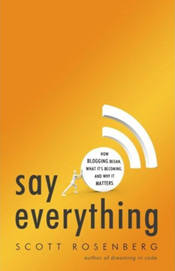BOOK REVIEW ‘say everything’ by Scott Rosenberg
 I have never been that interested in blogging, reading nor writing; consequently I don’t know much about the blogging practice. I began Rosenberg’s book hoping to find out “what blogs are all about”. Why should I blog? Rosenberg, a former newspaper journalist and co-founder of Salon.com, gave himself the difficult task of recounting the history of blogging and – as the subtitle indicates – providing an idea of what’s to come and ‘why it matters.’ I’m not sure if I got my answer after reading this book, but it gave me a peek into the origins of blogging and the strange world that’s ensued.
I have never been that interested in blogging, reading nor writing; consequently I don’t know much about the blogging practice. I began Rosenberg’s book hoping to find out “what blogs are all about”. Why should I blog? Rosenberg, a former newspaper journalist and co-founder of Salon.com, gave himself the difficult task of recounting the history of blogging and – as the subtitle indicates – providing an idea of what’s to come and ‘why it matters.’ I’m not sure if I got my answer after reading this book, but it gave me a peek into the origins of blogging and the strange world that’s ensued.
In the first part Rosenberg recounts the origins of the medium, ticking off a selection of several 90s-era tech pioneers of Silicon Valley who each in their own way contributed to blogs’ development. There’s the story, for instance of Justin Hall who repurposed the Web as a traditional tool for scholarship by scaling it down to a more intimate size and then blasting his confessions and intimacies out to the whole world. Hall turned the Web into ‘an arena for youthful self-exposure’. Rosenberg also points out where the origin of the word ‘blog’ can be found. Jorn Barger introduced the term “WebLog” as a substitute for the “news page” label in 1997. He specifically put in the capital L because he found the syllable blog “hideous”. In 1999 Peter Merholz, as a joke, decided to pronounce the word “weblog” as wee-blog. Or blog for short.
Blogs exploded in 1999 with Blogger and Blogspot, user-friendly software that allowed anyone to start their own page and spawned a multitude of new styles. In part two, Rosenberg elaborates on the types of blogs found on the web today, from mommy blogs (Dooce) to gossip blogs (Gawker) and professional blogs that struggle to monetize their output. Political blogs (“Talking Points Memo”) and warblogs (“Little Green Footballs”) feed the public’s suspicion that mainstream media aren’t performing their jobs well enough. In all instances, blogs provide a platform for anyone to discard their reliance on mainstream media, conduct their own research, and post their thoughts to a public.
Rosenberg’s fragmented sketches give rise to a colourful history of why people blog and what blogging means to them, their stories sharpened with technical detail. Rosenberg points out how blogging in someway answered the dream of the Web’s first inventors: ‘their creation would welcome contributions from every corner of the globe and open a floodgate of human creativity.’
Throughout his summary of blogging’s past and present incarnations, Rosenberg himself is not very clear about where his own opinions on the medium. He complements his somewhat dry summary of developments, wrapped in ‘funny’ anecdotes, with the book’s third section. Here he deals with more critical points of blogging, asking ‘what/who are bloggers?’ ‘Is blogging journalism?’ ‘what defines a journalist?’ He deals with the overload of blogs. ‘How is blogging changing us’. ‘Is it all crap’? Technorati’s report on the blogosphere from September 2008 reports 133 million total blogs indexed by the service since 2002. As Rosenberg points out not all of these blogs are active but even then the numbers are staggering.
This is where I got excited – and I have the feeling Rosenberg himself enjoys playing the role of the critic, even if his position is modest. He’s more energized than cynical about the possibilities. “Sneering at all these creations remains a tempting option – one that is even warranted on occasion. Thoughtful scepticism always has its place. But the Web’s outpouring of human expression deserves an exuberant response, too. It should delight us.” You can question blogging, how it’s used and how it changes us, but you can’t dismiss its part of our lives.
Rosenberg’s history is comprehensive, going over all the terms, every pro and con, and situating blogging context within the wider story of the Internet. But as a result his writings are too benign, too generously balanced, lacking the strong, personal point of view that Rosenberg himself points out as critical to blogs’ success. He does employ the fragmented writing style so typical of blogs, using short sketches of the various characters to build a larger, more complete picture. The last, critical chapters only somewhat mitigate this lack of strong opinion.
Much of what the book summarizes is already out there. I would’ve liked to see a new view or opinion on the matter and a more elaborate treatment of the microblog Twitter and Social Network Sites like Facebook. I think this was a missed opportunity to offer new insights on where blogging is going. Say everything is an extensive overview of how blogging began and its significance today. But it did not give an answer to what it’s becoming and what its evolution will mean for us in the future.